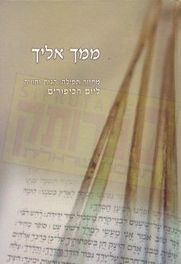As a student at Columbia and JTS, I am part of a community of others my age who are confronting the same challenges, and a diverse one in which a variety of views are represented. After watching the first season of the Israeli Drama Srugim, (referring to a kippah srugah, the knit head covering worn by religious zionist Israelis) I now have immersed myself in an Israeli community caught trying to maintain a similar middle ground between age-old values and modern pulls.
The series takes place in an area of south Jerusalem known as הביצה של קטמון, the swamp of Katamon, a neighborhood filled with religious Zionist Israelis in their mid to late twenties, many of whom are single and caught in the overwhelming dating scene. Along with the romantic adventures of the show's 5 main characters, Yif'at, Reut, Hodayah, Amir and Nati, they confront other philosophical and religious challenges as well.
Reut on a number of occasions attempts to challenge the preexisting boundaries of womens' ritual participation. In the first episode, she makes kiddush for the group of her friends at Shabbat dinner, a practice becoming more accepted and mainstream in the Modern orthodox community. In the show it is questioned, but nobody prevents Reut from fulfilling this mitzvah, showing an understanding of a woman's inherent equal obligation for Kiddush. Later on in the season, continuing to challenge these boundaries, Reut approaches a student at Yeshivat Mercaz Harav who gives Bar Mitzvah lessons (Yochai, whom she dates for a while) asking to learn how to read haftarah, which she wishes to do for her father's yahrzeit. Yochai at first refuses, agreeing to make a tape for her, but gradually agrees to teach her. One of the pinnacles of the show comes at the conclusion of episode 9, as Reut reads the Haftarah for Shabbat Rosh Hodesh in front of a womens' prayer group, including her closest friends.
| I pursue Your laws, on the one hand On the other, my passion pursues me. Ashamed and embarrassed, I will enter Your gates. And the long nights and the loneliness and the years, And this heart that has not known peace. Until the sea becomes quiet, until the shadows disappear. | אני רודף אחר חוקיך, מחד מאידך תשוקתי אותי רודפת בוש ונכלם אבוא בשעריך והלילות הארוכים והבדידות ושנים והלב הזה שלא ידע מרגוע עד שישקוט הים, עד שינוסו הצללים |
| Where shall I go, to where will I turn, when Your eyes gaze upon me? Where shall I flee, how will I not turn away? Between truth and truth, Between law and practice. Between the days of yore and modern times. Between the hidden and the revealed, Between the world to come and this world. | לאן אלך, אנה אפנה, כשעיניך מביטות בי איכה אברח, איך לא אפנה בין אמת לאמת בין הלכה למעשה בין הימים ההם לזמן הזה בין הנסתר לנגלה בין העולם הבא לעולם הזה |
| I pursue Your laws, on the other hand my passion burns me Fierce as death, terrible as troops with banners The long nights and the loneliness and the years, And this heart that has not known peace. Until the sea becomes quiet, until the shadows disappear Bring me back! | רודף אחר חוקיך, מאידך תשוקתי אותי שורפת עזה כמוות, איומה כנדגלות הלילות הארוכים והבדידות והשנים והלב הזה שלא ידע מרגוע עד שישקוט הים, עד שינוסו הצללים השיבני |
| Where shall I go, to where will I turn ... | לאן אלך, אנה אפנה ... |
 By Gabe Seed
By Gabe Seed


